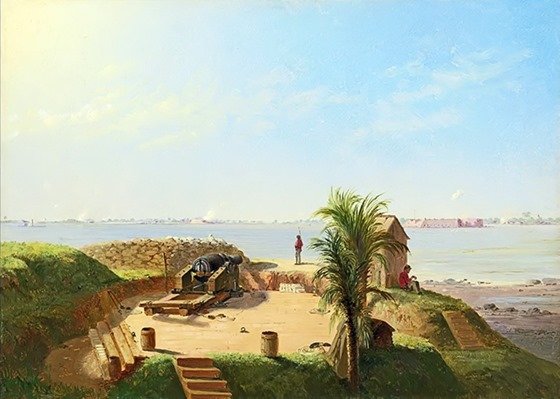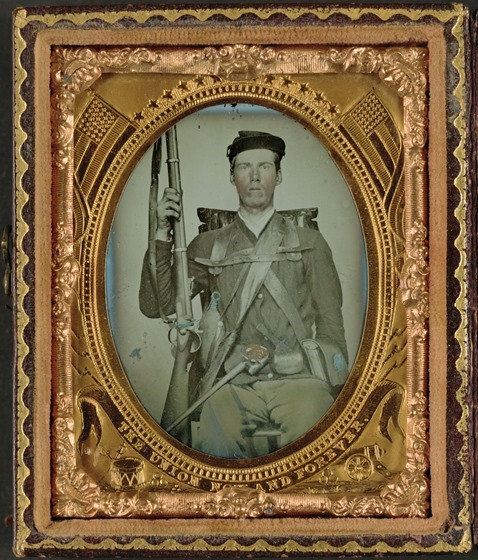En route, Wednesday, Nov. 4. Reveille sounded at 3 A. M. and the sleepy camp was soon ready to march. Started at 5. It was a dense, foggy morning and the red glare of innumerable camp fires lit up the infantry in heavy columns, giving the surroundings of the camp a wild and terrible aspect. We moved out moodily, the stars lighting us on our way for nearly three miles and a half before daylight appeared. The road was rough and covered with pebbles which made it very bad for the horses. One of mine being barefooted is somewhat lame. 10 A. M. We came up on to the camp of the 2nd Brigade at Rogersville, the town half a mile to the left of us. The 4th Division had just returned, having found the bridge over Elk River destroyed. Then it moved out on another road leading north, which gives twenty miles more travel I understand. We halted for three hours, unhitched and unharnessed, cleaned off our horses and fed them. The 2nd Brigade moved out soon after we came in. The 3rd Brigade came up at 12 M. At 1 P. M. we again took the road and an easy march of six miles took us to camp on a good creek, an old fashioned breast-wheel grist mill close by, the name I did not learn. The first five miles was a flat timbered country, uncultivated, but when we came towards the creek it broke up in hills and rocks where poor folks lived and picked up a scanty living. As soon as we approached camp, guns were heard in every direction, more than last night. Several bullets flew directly over camp, but fortunately nobody was hurt. Officers of the day and staff officers galloped in every direction endeavoring to stop it. A camp guard was thrown around the infantry with orders to keep all men from going in who had guns. But General Smith had commenced too late to stop this Division from foraging. The guards sat down and always looked the wrong way, and meat in plenty was brought. Our mess had laid in a supply early in the morning; six chickens, a beef and a goose was our stock for eight men. Mail received late in the evening but I received “nary” one.
Monday, November 4, 2013
Charles Francis Adams, Jr., to his mother.
Camp of 1st Mass. Cav’y
Near Warrenton, Va., November 4, 1863
Contrary to my expectations in my last we are daily expecting a movement of some kind, though what, we are at a loss to imagine. I look for it with mixed emotions. I know that we ought to move and by offensive operations keep a portion of the burden of the war from the shoulders of our armies in Tennessee, and I am in so far willing to be sacrificed; but every man in this army to whom bitter experience has taught the first principles of strategy, feels that it will be all sacrifice, that of ourselves we can effect nothing. We know now that every movement or raid to Richmond is foredoomed to disappointment; that Washington cannot be covered and Richmond taken at the same time. Our situation is that of a man fighting for his life, with one hand tied behind his back. Of course this condition of affairs bears more heavily on the Cavalry than on any other arm of the service. We are fairly used up, knocked off our legs. Marches, scouts, reconnoissances and battles have done their honest work and not much more can be gotten out of the Cavalry Corps this year. To show results let me state my own experience in a few words. In June I commanded two companies and had one hundred and ten men in the field. I now command three and have about forty effectives, not twenty of whom would be left at the end of four days hard service. The men are well enough, but the horses! Such a collection of crow’s bait the eye of man never saw. Solomon’s song of the war-horse was the most bitter satire ever conceived. He may have been wise in his day and generation, but he evidently never saw field-service, and they did n’t know everything down in Judee. . .
Charles Francis Adams to his son
St. Leonards, November 4, 1863
On this side we are now enjoying a period of repose. The only question of interest to us is that connected with the outfit of war vessels for the rebels. The appeal from the decision of Baron Pollock in the case of the Alexandra is just now coming on. Singularly enough the Baron shows symptoms of change of mind in regard to his own charge, the practical effect of which is to embarrass the proceeding, and perhaps to lead to the necessity of a new trial. I do not know whether this is to be regarded as a favorable result or otherwise. My theory heretofore has been that delay is a very good thing. But I am not sure that the Court of Exchequer is not now prepared to act upon the subject in a right spirit; which, if it were so, would put an end to farther question. Barring this, I know not that there is at present any cause of serious difficulty between the two countries. . . .
4th. Aroused before daylight. Struck tents and loaded wagons. About 8 A. M. again pitched tents and sent out forage detail. Voted on re-enlistment question. Co. C, 21. Well done for it. Felt proud, better than most companies. Had good visit with many of the boys. Finished “Lillian.” Thede got some apples. Pleasant day.
Wednesday, 4th—It is still quite warm. I was on fatigue at the fortifications. The men are pulling down some fine residences and using the material in building the forts. It is pretty harsh and severe business to order a family, brave enough to stay all through the siege, out of their home and tear down their house before their eyes, to build into fortifications, but this is war. We are fortifying the place so that ten thousand men can hold it against any force that has a mind to come.
November 4 — We renewed our move this morning, and joined the battalion in camping about three miles northwest of Brandy Station.
Painting by Conrad Wise Chapman.
This battery only had one gun and was close to Fort Moultrie. Forts Sumter and Johnson are seen in the distance. Near the palm tree was an old hotel – the Moseley House. A gun boat is out in the bay; and a shell can be seen bursting over Fort Sumter; the more shells that struck Sumter, the more impregnable it became, as their only effect was to level it and make it harder to take.” – Conrad Wise Chapman, 1898
Unidentified infantry soldier in Union uniform in full marching order with musket, canteen, cartridge box, cap box, and knapsack
__________
Ninth-plate ambrotype, hand-colored ; 7.5 x 5.8 cm (case)
Liljenquist Family Collection of Civil War Photographs; Ambrotype/Tintype photograph filing series; Library of Congress Prints and Photographs Division.
Record page for image is here.
__________
 Note – This image has been digitally adjusted for one or more of the following:
Note – This image has been digitally adjusted for one or more of the following:
- fade correction,
- color, contrast, and/or saturation enhancement
- selected spot and/or scratch removal
- cropped for composition and/or to accentuate subject matter
- straighten image
Civil War Portrait 083
by John Beauchamp Jones
NOVEMBER 4TH.–Mr. M_______, Major Ruffin’s commissary agent, denies selling government beef to the butchers; of course it was his own. But he has been ordered not to sell any more, while buying for the government.
Mr. Rouss, of Winchester, merchant, has succeeded in getting some brown cotton from the manufacturer, in Georgia, at cost, which he sells for cost and carriage to refugees. My wife got 20 yards to-day for $20. It is brown seven-eighth cotton, and brings in other stores $3 per yard. This is a saving of $40. And I bought 24 pounds of bacon of Capt. Warner, Commissary, at $1 per pound. The retail price is $2.50—and this is a saving of $36. Without such “short cuts” as these, occasionally, it would be impossible to maintain my family on the salaries my son Custis and myself get from the government, $3000.
How often have I and thousands in our youth expressed the wish to have lived during the first Revolution, or rather to have partaken of the excitements of war! Such is the romance or “enchantment” which “distance lends” “to the view.” Now we see and feel the horrors of war, and we are unanimous in the wish, if we survive to behold again the balmy sunshine of peace, that neither we nor our posterity may ever more be spectators of or participants in another war. And yet we know not how soon we might plunge into it, if an adequate necessity should arise. Henceforth, in all probability, we shall be a military people. But I shall seek the peaceful haunts of quiet seclusion, for which I sigh with great earnestness. O for a garden, a vine and fig-tree, and my library!
Among the strange events of this war, not the least is the position on slavery (approving it) maintained by the Bishop of Vermont.
November 4.—The troops belonging to the National expedition, under the command of Major General Banks, successfully landed at Brazos de Santiago, Texas, nine miles from the mouth of the Rio Grande del Norte.—(Doc. 6.)
—The bombardment of Fort Sumter continued.—Jefferson Davis visited James Island, Forts Pemberton, and Johnson, and all the rebel batteries around Charleston.
—The rebel Generals Chalmers and Lee attacked Moscow and La Fayette, Tenn., on the Memphis and Charleston Railroad, this day, at noon. They burned La Fayette, and some small bridges on the road. The Nationals repulsed them at Moscow. Colonel Hatch’s cavalry followed their retreat, and forced them to another fight four miles out, and again repulsed them. Between twenty and thirty of their dead were found on the field, among them three officers. Their dead and wounded were scattered along the road. In addition, three wagon-loads were taken away. Their loss probably reached one hundred. The Union loss was three killed, forty-one wounded, and forty-one missing. Colonel Hatch, of the Second Iowa, commanding the brigade, was seriously though not dangerously wounded, a ball piercing his right lung.











